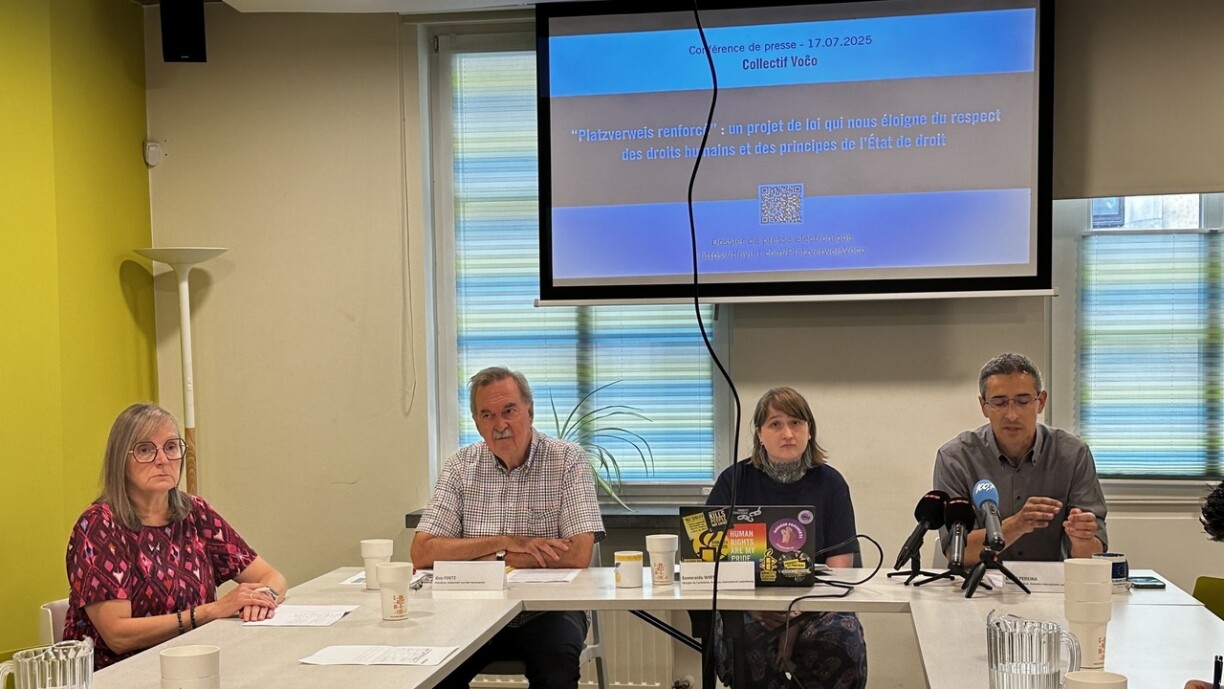
Voĉo, a coalition of 33 civil society organisations, has raised concerns that recent amendments to Draft Bill 8426 – which seeks to expand police powers by allowing officers to remove individuals causing disturbances from public spaces (“Platzverweis”) – do not go far enough. The collective argues that the proposed legislation remains “vague and arbitrary.”
Guy Foetz, president of the nonprofit Solidaritéit mat den Heescherten (Solidarity with Beggars), questioned whether the government is “using a sledgehammer to crack a nut”.
At a press conference, Voĉo warned that the bill could pose a broader threat to society, with some members calling for it to be scrapped entirely. “For us, it’s like opening Pandora’s box”, said David Pereira, director of Amnesty International Luxembourg. He cautioned that the law, once enacted, could eventually impact anyone – including protest organisers or journalists conducting interviews or recording in public spaces.
Despite amendments introduced in May, the collective maintains that the bill is still “vague, arbitrary, and potentially discriminatory”. Key terms such as “disturbance of public safety, hygiene, or peace” lack precise definitions, leaving room for subjective interpretation.
Voĉo also argues that the bill grants excessive discretionary power to police and mayors without clearly defined oversight or legal recourse. Esmeralda Wirtz, Amnesty International’s activism coordinator, highlighted that mayors could ban individuals from certain areas based on subjective assessments of what constitutes a disturbance.
Wirtz emphasised that the bill fails to meet the principle of legal predictability. “At what point is someone considered too loud? What activities qualify as disturbing public peace? These definitions are left arbitrary”, she said. Under the proposed law, an initial 48-hour ban could be imposed, with violations leading to extensions of up to 30 days.
Voĉo has also raised alarms over the bill’s potential to restrict protest rights, particularly due to the absence of an appeals process for individuals subjected to bans. Foetz noted that while debates around Luxembourg’s begging ban often cited the public prosecutor’s office as a check on enforcement, “here, the public prosecutor’s office doesn’t even come into play”.
Foetz further questioned the necessity of the law, arguing that banning individuals from public spaces is typically reserved for emergencies or imminent threats – a standard this bill fails to meet. Initially, the draft included a €250 fine for violations, but this was removed following a formal objection by the Council of State.
Voĉo contends that the proposal undermines rule-of-law and human rights principles by exacerbating the marginalisation of vulnerable groups rather than addressing root causes like poverty and inequality. The collective hopes the Council of State will maintain its formal opposition.
“The bill’s content must be watertight and not left to the arbitrary judgment of mayors, who may be swayed by voter pressure”, Foetz emphasised, doubting that local officials could make objective decisions in such cases. Pereira added that existing laws already empower police to intervene when behaviour threatens public safety, rendering the new measures redundant.